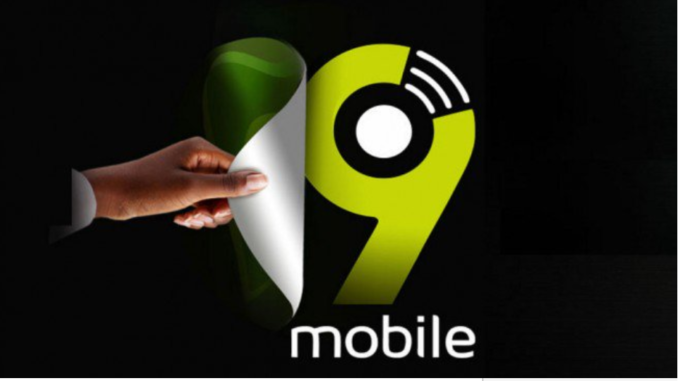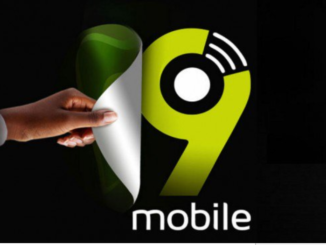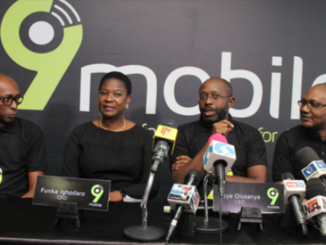
NIGERIA’s fourth telecom operator, 9mobile, has suffered a loss in market share estimated at N5.5 billion in six months, occasioned by the confusion and delay in the sale of the company.
The telecom company which prides itself as the most innovative, having tailored its services towards the growing army of Nigerian youths, has become hard to sell since the $1.2billion loan from a consortium of 13 foreign and local banks forced it to succumb to acquisition.
The mobile operator attracted over 16 bidders which have been narrowed down to two, Teleology and Smile technologies. Yet, a clear winner has not emerged.
Meanwhile, as at the time of writing this report, it is highly difficult to clearly say who is the preferred or reserved bidder in the sale process for a company the Nigerian Communications Commission, NCC, promised would have a new owner by the end of December 2017.
Market share and revenue loss
Meanwhile, the operator is losing ground in both voice subscriber base and internet users.
Financial Vanguard analysis of NCC’s Monthly Internet Subscribers data for December 2017, showed that 9mobile lost 68,341 internet users while competitors like MTN, Airtel and Globacom gained 2,642.666; 911,040 and 87,538 respectively.
While their gains took them to 36,069,597; 23,985.203 and 26,997,817 internet subscriptions respectively, 9mobile’s loss reduced its internet users to 11,338.839 as against 11,407,180 in November same year.
Worse is the rate at which the company loses market share and subscriber base.
Furthermore, data from NCC showed that, the once innovative company that boasted of over 21million subscribers is now has between 16 and 17 million subscribers, indicating decline of about four million subscribers in just six months.
N5.5billion lost
Using the last Average Revenue Per User (ARPU), statistics from NCC, 9mobile may have lost approximately N5.5billion in those four million subscribers.
ARPU, refers to the financial performance benchmark in the telecoms industry that measures the average monthly spending on each SIM card. The commission, in 2016, recorded that average monthly revenue generated by operators from each telecom subscriber, is estimated at around $4.5 (N1,372) with the official exchange rate currently at N305 to the dollar.
Going by that figure, the telecom company may have lost well over N5bn, in addition to the huge revenue it must have also lost in dropping 68,341 internet users in December.
Teleology vs Smile Technologies
Although it was rumoured, last week, that Teleology, a company run by former MTN CEO, Adrian Wood acquired the network for $500m, the supposed reserved bidder, Smile Technologies was also, at the same time, flaunting statistics that positioned it as a potential winner, creating confusion as regards the real state of the sale process.
Meanwhile, Spectrum Wireless, a company claiming to have lent 9Mobile $35m when it commenced operations in Nigeria, has also warned that anybody buying 9Mobile from the present board will be doing so illegally, as the board allegedly lost its locus standi when the court dissolved it last month. The company said until its $35m is paid back and a new board constituted, buying 9Mobile will be a deliberate act of illegality.
Working in fear
This has not only caused anxiety among the staff of the telecom company but has also created panic in the whole telecom industry.
A staff of the company, who spoke to Financial Vanguard on condition of anonymity, confessed that there is palpable fear among workers. “We are confused. In fact we are praying that this scenario ends quickly so we can know our fate. We come to work these days not knowing what will happen. Working in fear is not the best for any organisation and you can see the effect in the way subscribers lose interest in our offerings.”
The source told Financial Vanguard that one of the hindrances to smooth sale of the company is that people in the board are allegedly representing different interests. He appealed to the regulator to ensure transparency in the bid process.
NCC warns
Meanwhile, NCC has warned the public against relying on speculative reports on the process of 9mobile sale.
The Commission said that several reports that did not tally with the process have been making the rounds in the past few weeks. It advised that until official statements which will involve the two regulators, the NCC and the Central Bank of Nigeria, CBN, is out, every other information on the sale of 9mobile should be taken with a pinch of salt.
Executive Commissioner, Stakeholders’ Management of the Commission, Mr Sunday Dare, told Financial Vanguard that although the interim board of 9mobile is in charge of the bid process, it would submit reports to Barclays Africa, the financial adviser handling the sale of the telecoms company, NCC and CBN before any authentic announcement is made.
Reserved bidder
Dare said that the NCC was yet to receive any report indicating conclusion of the bid process and therefore any claim of preferred or reserved bidder could not be relied upon.
He however stated that all the stakeholders involved in the 9mobile sale, considered the interest of investors, subscribers, and over 2,000 employees of 9mobile as driving factor to a seamless and transparent process.
He expressed confidence in the board to maintain transparent handling of the telecom company’s sale process knowing that any shade of opaque handling of the process will create a dangerous ripple effect on the entire telecom sector.
He was reacting to the rumour that the interim board of 9mobile may have finally settled for Teleology Holdings Limited as the preferred bidder for 9mobile.
Criteria for 9mobile’s preferred bidder
Meanwhile, several stakeholders in the telecom sector have cautioned against relying on the size of the financial bid as the sole criterion in closing the 9Mobile sale.
For them, some other factors include contribution to the growth and development of Nigeria’s telecommunications sector, technology innovation, human capital development and employment opportunities to Nigerians should be highly considered.
Other factors they felt should not be ignored are local knowledge and direct financial contribution to the economy in terms of payment of taxes and levies, among others.
A telecom analyst, Mr James Imo, told Financial Vanguard that delaying the sale of 9mobile will devalue the company further and put the eventual buyer into great debt. He admitted that while it may not be easy to sell the company due to several litigations, among which is the one instituted by Spectrum Wireless, the two regulators, NCC and CBN should make effort to call Spectrum Wireless and other aggrieved parties to a round table to ensure 9mobile does not end up like NITEL.
He also advocated for urgent re-appraisal of the two finalists out of the 16 companies that started the race for the acquisition of 9Mobile, to ensure that the best emerged winner at the end of the process.
A look at the remaining contenders
There were three final contenders bidding to buy 9mobile before the New Year. However, it appears Globacom eventually dropped off the radar. Although, a reliable source at the second national carrier, told Financial Vanguard that Globacom did not withdraw from the bid and has not been informed why it is no more considered part of the bidding process, it is however, public knowledge that only two, Teleology and Smile, remain the final bidders.
Teleology Holdings Limited
Teleology Holdings Limited is a consortium of companies, with eminent Nigerians, including frontline politicians, revered traditional rulers and notable business executives as shareholders. The company is promoted by Adrian Wood, an international technology and investment executive. He is currently the Chief Executive Officer of Brymedia West Africa Limited.
He has served as Chief Executive Officer of MTN Nigeria and Group Managing Director of Daily Times Nigeria. His career spans major operators such as Telstra, Portugal Telecom, Telecom Finland-Sonera, France Telecom, Orange UK, Telenor.
Wood’s expertise extends to complex, geographical and culturally diverse businesses, brand development, growth in a regulated environment, capacity building, government and community relations.
Smile Telecoms Holdings Limited
A Mauritius-based Pan-African telecommunications group, with operations in Nigeria, Tanzania, Uganda and Democratic Republic of Congo, Smile has the largest sub-1 GHz 4G LTE commercial network in Africa, operating in the 800 MHz band, providing broadband services to its customers.
Smile launched commercial 4G LTE network in Dar es Salaam, Tanzania in May 2013 and June the same year, in Uganda. It has extended its coverage in Tanzania to 7 regions and 14 cities in Uganda.
In March 2014, Smile launched its first West-Africa’s 4G LTE mobile broadband service in Nigeria with coverage now extended to eight cities.
Smile Nigeria has a top drawer board headed by the consummate investor, Dr. Ernest Azudialu-Obiejesi.
The company has Ahmad Farroukh as the Executive Director, Operations. Farroukh, who recently served as the rescue CEO of Mobily, Saudi Arabia’s second largest telecommunications operator, was also the CEO of MTN Nigeria from 2006 to 2011. He is an experienced telecoms executive with a distinguished record of commercial success, extensive experience working in Nigeria and Africa and has an impressive ability to drive strategy and profitability in accordance with international standards.
History of 9mobile
9mobile began as Emerging Markets Telecommunications Services, EMTS, which first traded as Etisalat Nigeria. Duly incorporated under the laws of Nigeria in partnership with Mubadala Development Company and Etisalat of the United Arab Emirates, it acquired the Unified Access Licence from the Federal Government in January 2007. The licence includes a mobile licence and spectrum in the GSM 1800 and 900 MHz bands.
The telecom company made the first official call on its network on March 13, 2008 in the presence of officials from the Nigerian Communications Commission and the Senate. In September of same year, it kicked off commercial operations with the 0809uchoose campaign which enabled Nigerians choose numbers special to them as their mobile numbers.
Network rehabilitation
In April 2013, the company announced it would invest over $500 million to expand its network, enabling further potential market growth of 17 per cent and went ahead to obtain a medium term loan of $1.2bn from a consortium of 13 banks, which it used to refinance an existing $650 million loan and fund a modernisation of its network. The loan, which involved a foreign-backed guaranty bond, was for it to finance a major network rehabilitation and expansion of its operational base in Nigeria.
However, since 2016, the consortium of banks has been having a running battle with the mobile telephone operator over repayment of the loan facility. Although the company said it consistently serviced the debt until it began to experience cash flow problems following the steep depreciation of the naira and the impact on its foreign currency denominated exposure..
How Etisalat left
Following breakdown in negotiations, the company’s two foreign investors, Emirates Telecommunications Service and Mubadala withdrew their interest in the concern, compounding the problems of EMTS.
Chief Executive of Etisalat International, Hatem Dowidar, while announcing the withdrawal at Abu Dhabi Stock Exchange, gave Etisalat Nigeria just three weeks to use the brand name and phase it out completely.
Its technical partners, Mubadala, also followed suit, leading to a massive resignation of top executives of Etisalat Nigeria and the chairman of the board.
Regulatory interventions
At that point, it appeared a takeover was most likely but the intervention of Nigerian telecom and banking regulators, the Nigerian Communications Commission and the Central Bank of Nigeria, saved Etisalat Nigeria from being taken over by a consortium of Nigerian and foreign banks.
The two regulators persuaded the banks to rethink their threat and give Etisalat a chance to renegotiate the loan’s repayment schedule. Further negotiations brought about a new board comprising of appointees of the consortium, the telecommunications company and the regulators and subsequently a new name 9Mobile.
However, having seen that a new board and name change were not all it required to settle the loan which has been the heart of the matter, the regulators, the consortium, represented by its financial adviser, Backlays Africa and the board, agreed to put the telecom company for sale.
Incidentally, different interests, litigations, more debt claims among other bottlenecks, appear to be keeping the sale process in limbo.
END



Be the first to comment